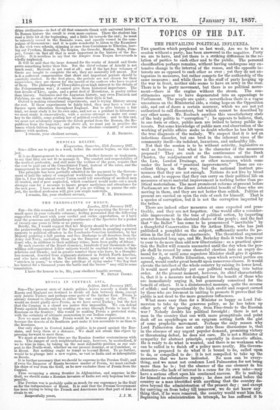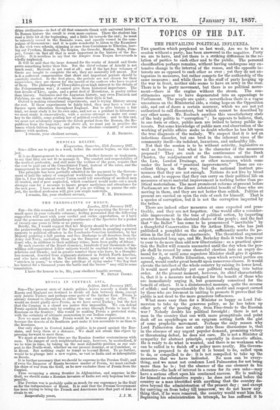TOPICS OF THE DAY.
TEE PREVAILING POLITICAL INFLUENZA.
THE question which perplexed us last week, Are we to have a session without a party, lies been answered in the negative. Party we are to have, and yet there is a striking difference in the relation of parties to each other and to the public. The personal classification perhaps remains, without having undergone any extensive change in the interval of the recess, and the opposite interests are as opposed to each other as ever ; yet they Ao not antagonize in measures but rather compete for the authorship of the same measures • and while there is the staff of party keeping up the war in front, neither side seems to have an army in the rear. There is to be party movement, but there is no political movement—there is the engine without the steam. The constituencies appear to have degenerated into an appendage to Parliament. The people are quiet; nevertheless there is a vague uneasiness on the Ministerial side, a rising hope on the Opposition side, and out of doors a certain murmur, which we are not yet authorized to call discontent, but which cannot be described by any other name. Mr. Roebuck ascribes this unsatisfactory state of the body politic to " corruption" ; he appears to believe, that, in one form or other, public men are bribed to betray public interests. But some knowledge of public men and observation of the working of public affairs make us doubt whether he has hit upon the true diagnosis of the malady. We suspect that it is not an infectious disorder, but one bred in the inherent vices of the community itself—its indolent, luxurious, and unhealthy life.
Not that the session is to be without activity„ legislative as well as factious ; but what is the character of the measures proposed ? They are such as the continuance of the Bank Charter, the readjustment of the Income-tax, amendments of the Law London Drainage, or other measures which come under the head of "practical improvements." These are excellent things in their way, but the national instinct pronounces that they are not enough. Nations do not live by bread alone, and to suppose that they can carry on their political life on measures of mere material improvement is nothing better than political materialism. The most prominent reforms at present before Parliament are for the direct substantial benefit of those who are moving in them., and they are not better than selfish. Politics at present are carried on upon the rule of each for himself. That is a species of corruption, but it is not the corruption imparted by the briber.
There are indeed other measures at once expected and practicable, and they are not forgotten. One would offer a considerable improvement in the tone of political action, by imparting greater freedom to the electoral choice of the people ; and the fact that "the Ballot" has come to be pronounced "inevitable" " by a thoughtful Conservative like Sir Arthur Elton, who has just published a pamphlet on the subject, sufficiently marks its position in the list of future enactments. The theoretical argument was exhausted long ago' and Mr. Berkeley finds it vain from year to year to do more than add new illustrations : as a practical question the Ballot will remain unenacted until the day when the people shall be roused by some shameful election into an angry demand for it, or until some sagacious Minister shall give it spontaneously. Again, Public Education, upon which several parties are agreed, would confer great benefit upon numerous classes. It would elevate the intellect of the whole country by raising its lower level. It would most probably put our political working into better order. At the present moment, however, its chief characteristie is, that it is a measure not designed for the benefit of those who are immediately urging it, but generously conceived for the benefit of others. It is a disinterested measure, quite the reverse of selfish ; and unquestionably the high credit and respect earned by those who arc foremost in uniting to promote it proves that the public is not dead to the more generous influences.
What more easy than for a Minister so happy as Lord Palmerston to take up the generous policy, as he has taken up other pets of the passing day, from Free-trade to the Russian war ? Nobody doubts his political foresight ; there is not a man in the country that can with more promptitude and point dash off an apophthegm or an epigram setting forth the gist of some prophetic movement. Perhaps the only reason why Lord Palmerston does not enter into these discussions is, that in the absence of any urgent popular demand, promising victory or threatening defeat, he does not care. He is not a Minister of sympathy for abstract principle, especially in domestic affairs. He is ready to do what is wanted, and there is no workman who
can be called in to finish off a policy more neatly. His Government is prepared to do what it is bound to do, called upon to do, or compelled to do : it is not compelled to take up the measures that we have indicated. No man can, be everything, and we must not condemn Lord Palmerston for not being more than he is ; but the absence of the one element in his character—the lack of interest in a cause for its own sake—may have a serious effect upon his continued success. He is making for himself no substantive repute ; he does not stand before the country as a man identified with anything that the country desires beyond the administration of the present day ; and except for carrying on from today till tomorrow, we do not know any thing that, if he were removed, the country would want him for. &ism civilization—in fact of all that connects Greek with universal history. In Roman history the result is even more curious. There the student has read a little bit at the beginning, and a little bit towards the end; he must be minutely, versed in the Samnite wars, and equally versed in the campaigns of Germanicus : and it is quite wonderful to listen to the Examiner in the viva. voce schools, skipping at once from Coriolanus to Tiberius, leaving out Pyrrhus, Hannibal, the Scipios, the Gracchi, Marius, Sulk, Pompey, Cmsar—in fact all that is most important in the history of the Republic. It is needless to say that the Empire from Trajan downwards is wholly neglected. It will be said that the large demand for the works of Arnold and Grote prove something better than this. But the third volume of Arnold is not much read; Merivale is not read at all ; and if the last four volumes of Grote are bought to complete the set, they are assuredly left uncut. Nor is it a sufficient compensation that short and important periods should be carefully studied. In the first place, the periods are not chosen for their importuner, they are chosen for the merits of the authors who have treated of them. The philosophy of Thucydides gives high interest to the details of the Peloponnesian war ; it cannot give them historical importance. The first decade of Livy, again, and a great deal of Ilerodotus, is poetry rather than history. Suetomus and the Augustan history, nay even Plutarch and Polybius, no one thinks of reading, because their style is bad.
Oxford is making educational experiments, and is trying History among the rest. If these experiments be fairly tried, they may have a vast influence upon education throughout England. But to give history a fair trial, we must study it for its own sake, and not as a pendant to literature ; we must study it consecutively, with a serious attempt to make out some key to the riddle, some guiding law of political evolution : and to this end, we must not arbitrarily separate the Greek period from the Roman, the Republican from the Imperial ; and above all, we must put in practice the lesson which Gibbon long ago taught us, the absolute continuity of ancient history with modern.
I remain, your obedient servant, J. H. BRIDGES.














































 Previous page
Previous page